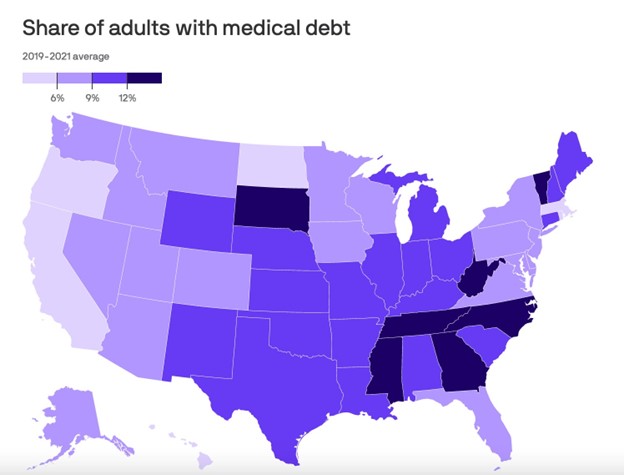Vermonters: The time is now to reach out to your legislators and insist they protect the mission of the Green Mountain Care Board to regulate and improve our access to healthcare in Vermont.

Unlike my prior columns on healthcare, this one will be short, concise, and easily understood. It’s a call-to-aims (sic) for all Vermonters concerned about their access to quality healthcare.
The legislative session is in full swing and the healthcare of all Vermonters is under discussion. Now is the time to contact your legislator and make clear to them your wishes.
Recent lobbying efforts by the Vermont Association of Hospital and Health Systems (VAHHS), UVM Health Network (UVMHN) and UVM Medical Center (UVMMC) to reduce the regulatory authority of the Green Mountain Care Board (GMCB) are circulating in legislative circles at a time when Vermonters need and deserve a more cost-efficient and accessible community of nonprofit hospitals.
The Green Mountain Care Board (GMCB) is the legislatively mandated authority charged with overseeing Vermont healthcare policy and delivering provider and insurer oversight and regulation with an eye both to providers’ and insurers’ fiscal stability and to the wellbeing of all Vermonters. Vermonters want a healthcare system that fulfills the nonprofit mission of providing quality care, timely access, and affordability.
Affordability, Expense and Access
Suffice it to say that the current dual crises in both affordability and wait times has left many Vermonters without timely access to local primary or chronic illness care, mental health and addiction services, and even emergency room services.
Although 97% of Vermonters have some form of health insurance, either through their employers, purchased directly, or through Medicare or Medicaid, most Vermonters are still seriously underinsured and often forego costly health services or incur debilitating debt. As of 2021, 187,800 or 40% of Vermonters under 65 were underinsured according to the Commonwealth Fund’s definition.
In a recent press release from UVMMC regarding their settlement with United Healthcare, they say, “UVMHN will always provide emergency care to anyone who comes through the door, regardless of what insurance they have or whether they have insurance at all,” but they fail to mention that this is required by law. And even then, UVMMC still bills uninsured patients the full price.
UVMMC emergency room use is over 30% higher than peer hospitals while primary care physician visits are lower than their peer group. Patients are getting sick and seeking care even though it may bankrupt them.
Below is a national map of states carrying significant medical debt and Vermont is among the worst: 
Property of Axios
A comparative expense analysis of UVMMC against 38 similarly-sized hospitals from FY 2022 data supplied by the National Academy of State Health Policy shows there is 20-30%, or some $360M to $550M of expenses declared on the FY 2022 Medicare Cost Report, that could be reduced.
Accessibility is also a key component of “Population health,” which is generally understood to be the health outcomes of a specified group of individuals, i.e. Vermonters. Its key drivers are care quality, timely access, and affordability. Each is a function of the whole. If one can’t afford treatment or insurance or schedule appointments, quality is meaningless. Care quality itself, if accessible, can often be excellent.
According to UVMMC data requested by the GMCB regarding wait times across UVMMC’s 83 clinical departments, of 7611 new patients presenting, most had to wait weeks to be seen at UVM or its affiliates and a large majority had to wait half a year or more. The inability to accommodate patients needing help in a timely manner can mean that their medical conditions deteriorate significantly before treatment is available. I’ve had three male friends who, between the time they presented with low-back pain and the time they received a diagnosis of late-stage prostate cancer, 8-13 months elapsed.
* * *
I’ll spare you a review of the history of the GMCB’s effectiveness since its founding in 2011 but recent efforts by a revitalized GMCB to rein in the fastest growing healthcare costs in the U.S. at between 15 and 20% per year and to improve access have not been well-received by some of Vermont’s hospitals.
Vermonters don’t need to immerse themselves in the intricate political gaming inside the Legislature and business community around compromising the authority of the GMCB. But we must ask ourselves and our legislators whether future Vermont healthcare policy will favor an expansive and expensive business, richly rewarding its administrators, or will it be held to account by the GMCB as a nonprofit network of cost-efficient, local primary-care facilities, regional critical access hospitals, and two tertiary-care hospitals (UVM and Dartmouth)… each driven by mission and acting in the best interests of their patients?
After what appears to be a resounding defeat of S.211, a bill drafted and introduced by Sen. Ginny Lyons and sponsored by Sen. Alison Clarkson and Sen. Jane Kitchell, which would have transferred health care policy and interpretation of GMCB regulation to the Agency of Human Services (AHS), when 27 health leaders and reform advocates posted a letter opposing the bill in VTDigger. But the effort did not end there.
Lobbying pressure now focuses on including the provisions of S.211 in the Center for Medicare and Medicaid Services’ (CMS) All-payer Health Equity Approaches and Development (AHEAD) model. UVMHN is refusing to participate in health reform efforts unless this change occurs, a strongarm effort that essentially holds their participation in the AHEAD model hostage. The goal is to force GMCB to stop controlling the prices they charge to patients with commercial insurance like Blue Cross Blue Shield VT (BCBS), which must then pass the new prices onto its customers in higher premiums, copays, and deductibles whether or not that patient is seen at a UVM-affiliated facility.
When a legislator wants to pass an unpopular bill like S.211 that was opposed by every member of Sen. Lyons own committee, they often use a “rider” tactic, attaching it to a popular bill that is destined to pass ̶ if you want the good in this bill, you’ll have to accept the bad we’ve attached to it. (Tactics like this are inconsistent with Vermont lawmaking and have been outlawed in many states and I would argue that the “rider tactic” should be in Vermont.)
Lobbied hard by UVMHN, UVMMC and VAHHS to shift the authority of the GMCB to the more politically malleable and less transparent Vermont Agency of Human Services (AHS) under the leadership of its Secretary, Jenney Samuelson are ongoing. The ambiguous protestations of Senators Ginny Lyons and Jane Kitchell in support of the GMCB are belied by a behind-the-scenes effort to transfer all Vermont healthcare policy design, budget oversight, and final rate regulation to AHS, along with a parallel effort to subsume the GMCB itself under AHS as well. This consolidation effort is specified in bill S.183.
Sadly, UVM’s response has been not to find ways to improve, but instead to go to legislators and try and diminish GMCB’s regulatory authority by moving oversight into AHS behind closed doors. This will allow UVMHN and VAHHS to pressure one politically-appointed person whose agency is not bound by Vermont’s Open-meeting Law. The GMCB is the one government entity working in open meetings that can hold UVMHN to account on access, affordability, and quality.
There are also some forty active healthcare reform advocates with deep experience inside and outside our healthcare system who’ve expressed their concern elsewhere that the system will succeed in evading regulatory oversight ̶ a system that is among the least affordable and accessible in the nation. But more important are the countless Vermonters who’ve despaired of our current healthcare system.
Now is the time to reach out and make your voice heard. You can contact your legislators and Senators Lyons (vlyons@leg.state.vt.us), and Kitchell (jkitchel@leg.state.vt.us), and Rep. Houghton LHoughton@leg.state.vt.us) to make clear to them where you stand on the future of your healthcare. You can also write letters to your local papers or post your thoughts on VTDigger.org or on Front Porch Forum.
“Dear Legislator, I am writing to ask you to oppose any reduction in the current statutory authority of the Green Mountain Care Board. It is the only regulatory body in Vermont fighting for my future healthcare. Thank you.”

